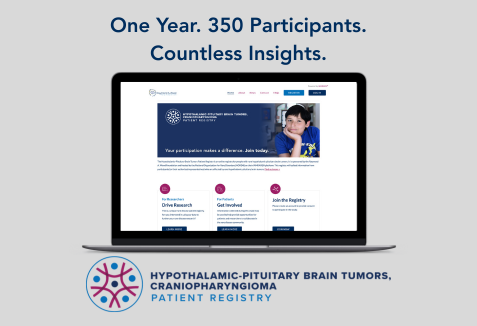Celebrating the first anniversary of the Hypothalamic-Pituitary Brain Tumor Patient Registry—and the power of shared experience to drive change.
One year ago, the Raymond A. Wood Foundation launched the Hypothalamic-Pituitary Brain Tumor Patient Registry with a vision: to bring together the lived experiences of patients and caregivers to advance research, improve care, and ultimately, change lives. Today, we’re proud to share just how far we’ve come—and how much farther we can go together.
By the Numbers
In just 12 months, nearly 350 individuals have joined the registry—including 310 individuals diagnosed with craniopharyngioma (CP). This is an incredible testament to the power of community and a shared commitment to science and advocacy.
Where our participants live:
While 73% of our CP participants are from the United States, we’ve welcomed registry members from 22 other countries, including Argentina, Brazil, Australia, Canada, Egypt, and across Europe, Asia, and South America. This global representation underscores the universal challenges of this rare disease—and the importance of collective action.
What We’re Learning
This registry isn’t just about collecting data—it’s about uncovering insights that can drive meaningful change. Here are just a few of the critical learnings from the first year:
- 65% of CP participants have not experienced tumor recurrence.
- 49% have been diagnosed with hypothalamic obesity (HO), aligning with existing medical literature. However, 9% remain unsure if they have this diagnosis—highlighting a need for better education and care.
- On average, patients report managing 14 ongoing health issues post-treatment, with fatigue ranking among the most disruptive symptoms after hypopituitarism.
The impact on eating behaviors is profound:
- 78% experienced significant weight gain after treatment.
- 52% noted a sharp increase in hunger immediately following treatment.
- 42% of CP patients have engaged in food-seeking behaviors such as stealing food or money due to extreme hunger.
- In children, 12% were reported to eat inedible or distasteful items to try to satisfy that hunger.
Education & Work
- 42% of CP individuals received special education or support in school.
- 11% hold a master’s degree, and 7 have earned doctorates—a powerful reminder of the resilience and determination of this community.
- Despite ongoing health challenges, 33% are working full- or part-time, redefining what it means to live with CP.
Advancing Research
Over the past year, the registry supported or launched three research projects:
- Eating behaviors in CP
- Treatment priorities from the patient/caregiver perspective
- Fatigue in collaboration with Rhythm Pharmaceuticals
Additionally, four external research groups used the registry to recruit participants for their clinical trials or studies—a direct demonstration of how your participation is accelerating research.
Thank You for Joining Us
To those who have enrolled: thank you. Your voice, your experience, and your time are making an impact far beyond this registry. You’re part of a movement to transform care for a population that too often goes unheard.
Not Part of the Registry Yet?
If you or your loved one has a hypothalamic-pituitary brain tumor like craniopharyngioma, your story matters. Every data point helps us paint a fuller picture of life with this condition—what’s working in treatment, where support is lacking, and how we can create a better future for all.
Join the registry today and be a part of the next chapter in rare disease research and advocacy.
Together, we are building something powerful. Here’s to another year of progress, partnership, and possibility.

